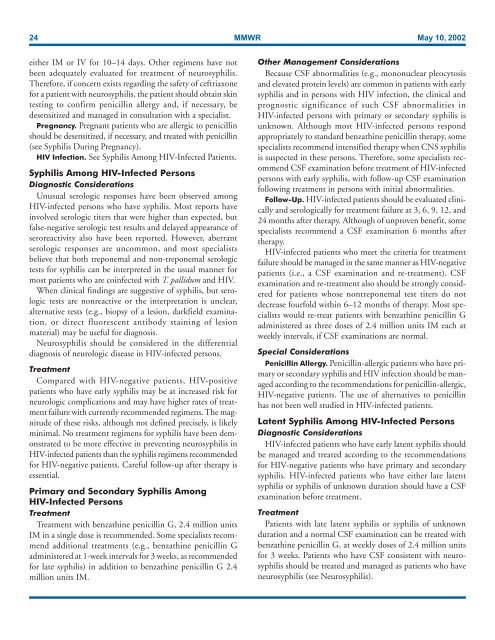You also want an ePaper? Increase the reach of your titles
YUMPU automatically turns print PDFs into web optimized ePapers that Google loves.
24 MMWR May 10, 2002<br />
either IM or IV for 10–14 days. Other regimens have not<br />
been adequately evaluated for treatment of neurosyphilis.<br />
Therefore, if concern exists regarding the safety of ceftriaxone<br />
for a patient with neurosyphilis, the patient should obtain skin<br />
testing to confirm penicillin allergy and, if necessary, be<br />
desensitized and managed in consultation with a specialist.<br />
Pregnancy. Pregnant patients who are allergic to penicillin<br />
should be desensitized, if necessary, and treated with penicillin<br />
(see Syphilis During Pregnancy).<br />
HIV Infection. See Syphilis Among HIV-Infected Patients.<br />
Syphilis Among HIV-Infected Persons<br />
Diagnostic Considerations<br />
Unusual serologic responses have been observed among<br />
HIV-infected persons who have syphilis. Most reports have<br />
involved serologic titers that were higher than expected, but<br />
false-negative serologic test results and delayed appearance of<br />
seroreactivity also have been reported. However, aberrant<br />
serologic responses are uncommon, and most specialists<br />
believe that both treponemal and non-treponemal serologic<br />
tests for syphilis can be interpreted in the usual manner for<br />
most patients who are coinfected with T. pallidum and HIV.<br />
When clinical findings are suggestive of syphilis, but serologic<br />
tests are nonreactive or the interpretation is unclear,<br />
alternative tests (e.g., biopsy of a lesion, darkfield examination,<br />
or direct fluorescent antibody staining of lesion<br />
material) may be useful for diagnosis.<br />
Neurosyphilis should be considered in the differential<br />
diagnosis of neurologic disease in HIV-infected persons.<br />
Treatment<br />
Compared with HIV-negative patients, HIV-positive<br />
patients who have early syphilis may be at increased risk for<br />
neurologic complications and may have higher rates of treatment<br />
failure with currently recommended regimens. The magnitude<br />
of these risks, although not defined precisely, is likely<br />
minimal. No treatment regimens for syphilis have been demonstrated<br />
to be more effective in preventing neurosyphilis in<br />
HIV-infected patients than the syphilis regimens recommended<br />
for HIV-negative patients. Careful follow-up after therapy is<br />
essential.<br />
Primary and Secondary Syphilis Among<br />
HIV-Infected Persons<br />
Treatment<br />
Treatment with benzathine penicillin G, 2.4 million units<br />
IM in a single dose is recommended. Some specialists recommend<br />
additional treatments (e.g., benzathine penicillin G<br />
administered at 1-week intervals for 3 weeks, as recommended<br />
for late syphilis) in addition to benzathine penicillin G 2.4<br />
million units IM.<br />
Other Management Considerations<br />
Because CSF abnormalities (e.g., mononuclear pleocytosis<br />
and elevated protein levels) are common in patients with early<br />
syphilis and in persons with HIV infection, the clinical and<br />
prognostic significance of such CSF abnormalities in<br />
HIV-infected persons with primary or secondary syphilis is<br />
unknown. Although most HIV-infected persons respond<br />
appropriately to standard benzathine penicillin therapy, some<br />
specialists recommend intensified therapy when CNS syphilis<br />
is suspected in these persons. Therefore, some specialists recommend<br />
CSF examination before treatment of HIV-infected<br />
persons with early syphilis, with follow-up CSF examination<br />
following treatment in persons with initial abnormalities.<br />
Follow-Up. HIV-infected patients should be evaluated clinically<br />
and serologically for treatment failure at 3, 6, 9, 12, and<br />
24 months after therapy. Although of unproven benefit, some<br />
specialists recommend a CSF examination 6 months after<br />
therapy.<br />
HIV-infected patients who meet the criteria for treatment<br />
failure should be managed in the same manner as HIV-negative<br />
patients (i.e., a CSF examination and re-treatment). CSF<br />
examination and re-treatment also should be strongly considered<br />
for patients whose nontreponemal test titers do not<br />
decrease fourfold within 6–12 months of therapy. Most specialists<br />
would re-treat patients with benzathine penicillin G<br />
administered as three doses of 2.4 million units IM each at<br />
weekly intervals, if CSF examinations are normal.<br />
Special Considerations<br />
Penicillin Allergy. Penicillin-allergic patients who have primary<br />
or secondary syphilis and HIV infection should be managed<br />
according to the recommendations for penicillin-allergic,<br />
HIV-negative patients. The use of alternatives to penicillin<br />
has not been well studied in HIV-infected patients.<br />
Latent Syphilis Among HIV-Infected Persons<br />
Diagnostic Considerations<br />
HIV-infected patients who have early latent syphilis should<br />
be managed and treated according to the recommendations<br />
for HIV-negative patients who have primary and secondary<br />
syphilis. HIV-infected patients who have either late latent<br />
syphilis or syphilis of unknown duration should have a CSF<br />
examination before treatment.<br />
Treatment<br />
Patients with late latent syphilis or syphilis of unknown<br />
duration and a normal CSF examination can be treated with<br />
benzathine penicillin G, at weekly doses of 2.4 million units<br />
for 3 weeks. Patients who have CSF consistent with neurosyphilis<br />
should be treated and managed as patients who have<br />
neurosyphilis (see Neurosyphilis).


